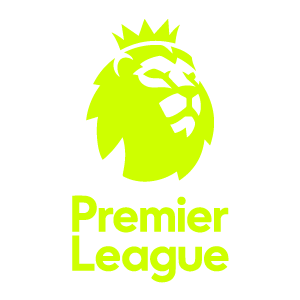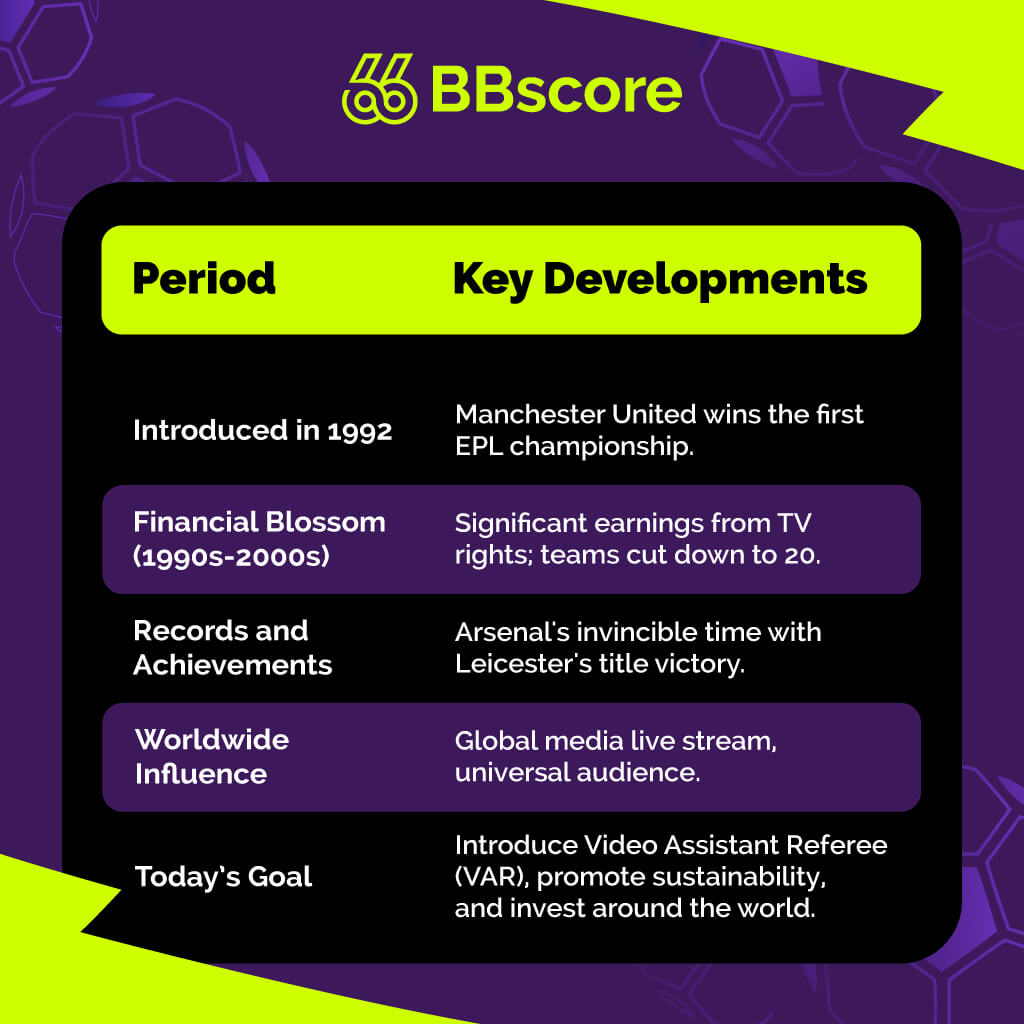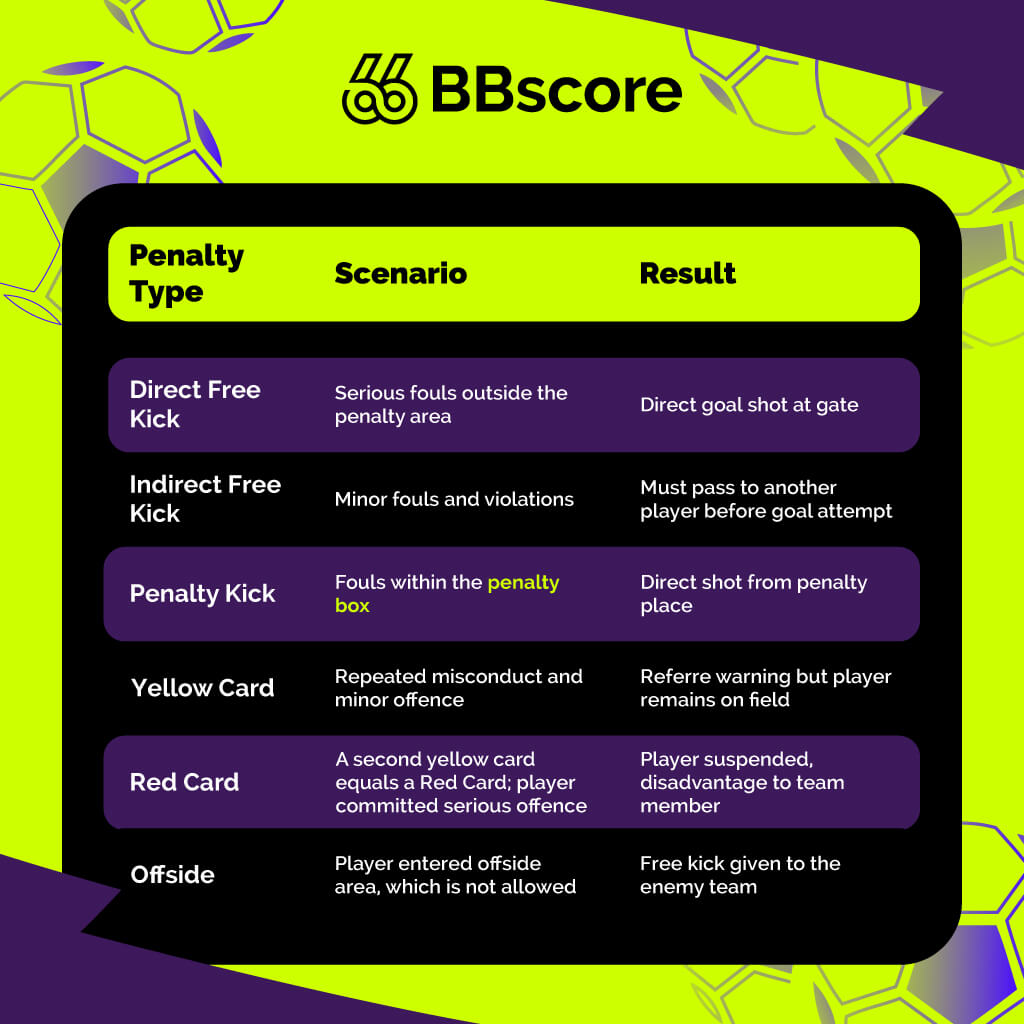HomeWorld Football LeaguesPremier League Table
Premier League Table
A Brief Overview of the EPL
One of the most watched football leagues in the world, the English Premier League (EPL) is the highest level of professional football in England. During the course of a 38-week season beginning in August and ending in May, 20 different clubs compete against one another. There are 38 games total, and the squad who won the most points becomes the winner. Fans can access live football scores on our website and app.

Premier League Score









Featured News
History of the English Premier League (EPL)
The English Premier League (EPL) is considered the most successful and popular football watched worldwide. Since 1992 formation, the Premier League has witnessed several clubs rise to status, each leaving their own influence on football history.
|
Period |
Key Developments |
|
Introduced in 1992 |
Manchester United wins the first EPL championship. |
|
Financial Blossom (1990s-2000s) |
Significant earnings from TV rights; teams cut down to 20. |
|
Records and Achievements |
Arsenal’s invincible time with Leicester’s title victory. |
|
Worldwide Influence |
Global media live stream, universal audience. |
|
Today’s Goal |
Introduce Video Assistant Referee (VAR), promote sustainability, and invest around the world. |

Premier League Table Development
First Success: Age of Manchester United (MU)
Manchester United’s first Premier League victory placed a standard for other teams. Sir Alex Ferguson coached Manchester United to 13 Premier League championships from 1992 to 2013. Strategic genius, a solid talent academy, and smart investments helped the club dominate the age. The “Class of ’92,” including David Beckham, Ryan Giggs, and Paul Scholes, helped Manchester United achieve a record-breaking season.
Reference credit: Wikipedia EPL English Premier League
Rise of Worthy Foes: Arsenal, Manchester City, and Chelsea
Manchester United ruled the beginning, although other clubs challenged them. The 2003–2004 year featured Arsenal, under Arsène Wenger, become “The Invincibles.” Wenger’s combination of managerial talent and athletic ability formed an appealing sight to witness and a hard to defeat club – Arsenal.
The 2004 appointing coach José Mourinho initiated Chelsea trek to stardom. Chelsea become a British football force following Roman Abramovich, claiming five Premier League trophies during 2005 and 2017. Chelsea were impressive thanks to Mourinho’s aggressive knowledge and effective defense.
With Pep Guardiola leadership, increasing funding made Manchester City into a hot football team. Manchester City has achieved 7 Premier League wins since 2012, scoring an all-time high 100 points in 2017-2018. Guardiola’s possession-based strategy and inventive approaches again redefined Premier League benchmarks.
Greatest Premier League Football Teams
The Premier League has fostered a number of the greatest football teams, enriching the football legacy. Manchester United, Arsenal, and Manchester City’s continued accomplishments, undefeated moments, and historic performances each deserve credit, including the player who strives never to impress but a breakthrough of limit and boundary.
The Manchester United team (1998-1999)
The 1998-1999
Manchester United team, who captured the Premier League, FA Cup, and UEFA Champions League in a single season, is regarded as to be the greatest in the history of the Premier League. The Champions League final return in favor of Bayern Munich showcasing the team’s never-say-die mentality.
F.C. Season of Arsenal (2003–2004)
Only Arsenal, the “Invincibles” won a complete Premier League season undefeated. Arsenal players Thierry Henry, Dennis Bergkamp, and Robert Pirès spearheaded Wenger’s defending and offensive actions. Mobility and unity made the squad one of the most idolized in the field of football.
The Manchester City team (2017-2018)
Manchester City under Pep Guardiola redefined Premier League dominance in 2017-2018. The team scored 106 goals and dropped 27 to reach the milestone of the first club to surpass 100 points in a season. Many teams to this day, operate similar to the team, with rapid passing, high pressing, and situational versatility.
Things You Need to Know: English Premier League (EPL)
League Play System
The EPL employs a League system of promotion and relegation, similar to the English Football League’s EFL Championship. Each match competes with 1 Home team and the other Away team. The 3 clubs that finish last in the league are sent to the EFL Championship. The Championship’s top two teams and the play-off winner get promoted to the EPL.
Match Format
A whole game lasts 90 minutes and is divided into two 45-minute halves with a 15-minute break in between. Points are calculated as shown below:
- Win: 3 points
- Draw: 1 point
- Loss: 0 points
The Top Teams and Their Best Rivals
Club History
For football matches in England, Manchester United (MU), Liverpool, Arsenal, and Chelsea have historically been successful teams with large fanbases worldwide.
Manchester United: Famous for its glorious past and a bounty of trophies.
Liverpool: Celebrated in Europe and with devoted fans.
Arsenal: Known for its triumphant times and captivating soccer tactics.
Chelsea: Awarded for outstanding accomplishments and enormous investments.
Key Rivals
Among all of the fierce competition in the English Premier League that with the highest attention, we have:
- North-West Derby: Manchester United vs Liverpool
- North London Derby: Arsenal vs Tottenham Hotspur
- Manchester Derby: Manchester United vs Manchester City
Learn The Premier League Table: A Quick Review
Here is a quick review for Premier League table:
Points System
Football clubs are ranked in the league table as reported by their point total. When teams result in ties during standings, the goal difference—the gap between their total goals scored and their total goals allowed—is carried out to decide who won.
Goal Difference
In a highly competitive season, goal difference can be a major factor in league positions to find out the winner.
Type of Key Player Playing Positions
Goalkeeper
The goalkeeper (GK) is responsible for preventing opposing teams from attack by defending the field. Only goalkeepers can use their hands in the area known as the penalty box.
Key skills: Reflexes, dexterity, shot-stopping, and defensive coordination.
Defender
Defenders are responsible for stopping the opposing team from scoring. Positions include centre-back, full-back, and wing-back.
Defenders line up in front of of a keeper to stop opponent attackers.
- Centre-Back (CB) Role: Main defender with center position in front of goalkeeper. Defenders obstruct attacks, interrupt passes, and defend rival strikers.
Key Skills: Strength, positioning, aerial ability, tackling. - Full-Back (FB) Role: Full-backs play on right and left sides of the defense. They prevent wingers from entering and back up the attack by swarming down the ambush.
Key Skills: Rapidity, stamina, tackling, crossing. - Wing-Back (WB) Position: Similar to full-backs but more attack-oriented. They defend and assault from a better position when opportunity shows up and often create dimension in a team’s formation.
Key Skills: Sprinting, passing, and pushing.
Midfielder
Midfielders: Regulate the pace of the game by moving between the defense and the offense. Equally spread as central midfielder, defensive midfielder, and attacking midfielder.
- Central midfielders (CMs) are multi-talented players that can help out on offense and defense. Versatile in both aways on the football field.
Crucial skills call for Passing, observing, and tackling. - Defensive midfielder (DM) job is to shield the defense from attacks and prevent them from scoring.
Crucial demands Strength, positioning, and charging. - Attacking midfielders (AMs) set up scoring chances by positioning closer to the forwards.
Skills require: Insightful, aggressive passing, and sprinting.
Forward
Forward is the leading goal-scorers, standing forward close to the opposing team’s net. They are known as forwards. Roles categorized into striker, winger, and centre-forward.
- Striker: often positioned in the middle of the field, is the main scorer for a team.
Key qualities like speed, placement, and finishing. - Winger (Left Wing/Right Wing): Assault on the left (LW) or the right (RW) side. Along with delivering crosses, they frequently make slits to shoot.
Key attributes like speed, handling ability, and shooting accuracy. - Center-Forwards (CFs): They play a role similar to a striker but also help link defense and offense. Their jobs include scoring and setting up goals.
Exceptional in delivery, controlling, and positioning.
Summary Common Penalties for Football Fan

|
Penalty Type |
Scenario |
Result |
|
Direct Free Kick |
Serious fouls outside the penalty area |
Direct goal shot at gate |
|
Indirect Free Kick |
Minor fouls and violations |
Must pass to another player before goal attempt |
|
Penalty Kick |
Fouls within the penalty box |
Direct shot from penalty place |
|
Yellow Card |
Repeated misconduct and minor offence |
Referre warning but player remains on field |
|
Red Card |
A second yellow card equals a Red Card; player committed serious offence |
Player suspended, disadvantage to team member |
|
Offside |
Player entered offside area, which is not allowed |
Free kick given to the enemy team |
